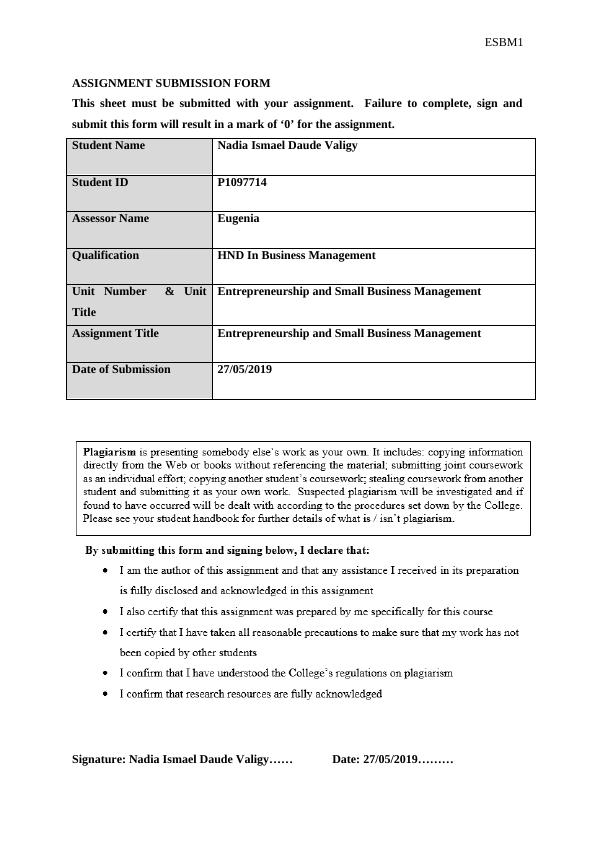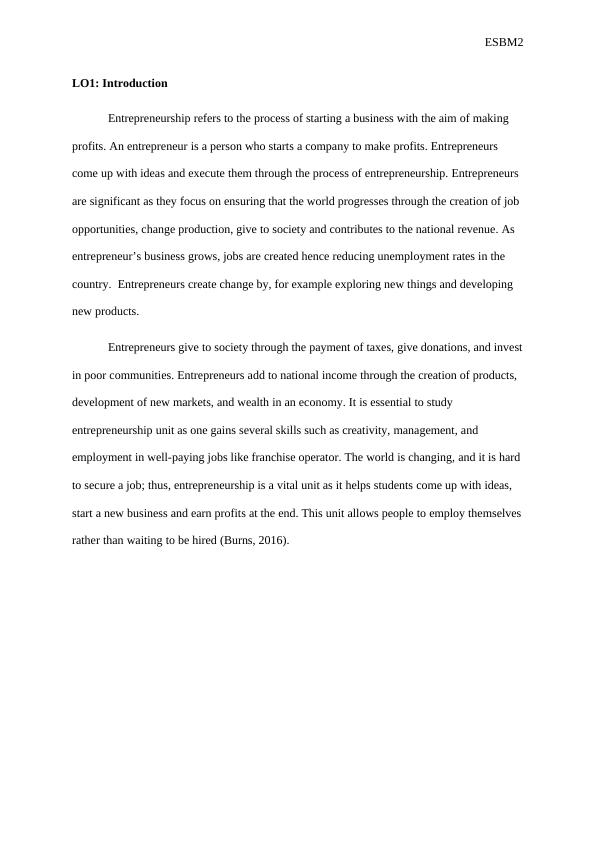Assignment Submission Form 2022
Added on 2022-10-18
18 Pages4066 Words13 Views
ESBM1
ASSIGNMENT SUBMISSION FORM
This sheet must be submitted with your assignment. Failure to complete, sign and
submit this form will result in a mark of ‘0’ for the assignment.
Student Name Nadia Ismael Daude Valigy
Student ID P1097714
Assessor Name Eugenia
Qualification HND In Business Management
Unit Number & Unit
Title
Entrepreneurship and Small Business Management
Assignment Title Entrepreneurship and Small Business Management
Date of Submission 27/05/2019
Signature: Nadia Ismael Daude Valigy...... Date: 27/05/2019.........
ASSIGNMENT SUBMISSION FORM
This sheet must be submitted with your assignment. Failure to complete, sign and
submit this form will result in a mark of ‘0’ for the assignment.
Student Name Nadia Ismael Daude Valigy
Student ID P1097714
Assessor Name Eugenia
Qualification HND In Business Management
Unit Number & Unit
Title
Entrepreneurship and Small Business Management
Assignment Title Entrepreneurship and Small Business Management
Date of Submission 27/05/2019
Signature: Nadia Ismael Daude Valigy...... Date: 27/05/2019.........

ESBM2
LO1: Introduction
Entrepreneurship refers to the process of starting a business with the aim of making
profits. An entrepreneur is a person who starts a company to make profits. Entrepreneurs
come up with ideas and execute them through the process of entrepreneurship. Entrepreneurs
are significant as they focus on ensuring that the world progresses through the creation of job
opportunities, change production, give to society and contributes to the national revenue. As
entrepreneur’s business grows, jobs are created hence reducing unemployment rates in the
country. Entrepreneurs create change by, for example exploring new things and developing
new products.
Entrepreneurs give to society through the payment of taxes, give donations, and invest
in poor communities. Entrepreneurs add to national income through the creation of products,
development of new markets, and wealth in an economy. It is essential to study
entrepreneurship unit as one gains several skills such as creativity, management, and
employment in well-paying jobs like franchise operator. The world is changing, and it is hard
to secure a job; thus, entrepreneurship is a vital unit as it helps students come up with ideas,
start a new business and earn profits at the end. This unit allows people to employ themselves
rather than waiting to be hired (Burns, 2016).
LO1: Introduction
Entrepreneurship refers to the process of starting a business with the aim of making
profits. An entrepreneur is a person who starts a company to make profits. Entrepreneurs
come up with ideas and execute them through the process of entrepreneurship. Entrepreneurs
are significant as they focus on ensuring that the world progresses through the creation of job
opportunities, change production, give to society and contributes to the national revenue. As
entrepreneur’s business grows, jobs are created hence reducing unemployment rates in the
country. Entrepreneurs create change by, for example exploring new things and developing
new products.
Entrepreneurs give to society through the payment of taxes, give donations, and invest
in poor communities. Entrepreneurs add to national income through the creation of products,
development of new markets, and wealth in an economy. It is essential to study
entrepreneurship unit as one gains several skills such as creativity, management, and
employment in well-paying jobs like franchise operator. The world is changing, and it is hard
to secure a job; thus, entrepreneurship is a vital unit as it helps students come up with ideas,
start a new business and earn profits at the end. This unit allows people to employ themselves
rather than waiting to be hired (Burns, 2016).

ESBM3
Types of Entrepreneurial Ventures
With the skills and knowledge gained from this unit, people can come up with
different entrepreneurial ventures which differ in size, potential, and vision. Entrepreneurs'
start-up businesses with different aims like growth, innovation, and profitability. Different
goals result in various types of entrepreneurial ventures such as family businesses ventures,
good social ventures, established or large business ventures, and high growth companies.
Family businesses comprise of small companies, independently owned to raise profits and
income to support a family. Family firms are created and developed to generate the revenue
required to provide basic need to the family such as food, shelter, clothing, and education.
Family ventures may sometimes grow or not grow depending on the innovativeness of the
entrepreneur. Many family ventures which are only managed by family members may not,
but those who hire external employees eventually grow. Family ventures consist of different
kind of business-like restaurants, agriculture, retail stores, and construction firms. Family
ventures primary source of capital is personal funds, family, or friends but can also borrow
from banks.
Social good enterprises are an entrepreneurial venture created and developed to
provide innovative solutions to bring change in the world. Social enterprise includes
companies with a specific goal like solve health issues and non-profits companies with a
charitable mission. Social ventures are not profit oriented and therefore, provide social
benefits and improve people's lives. Established companies are large businesses created to
generate revenue for the company and the shareholders. Established businesses are very
significant in employment creation as they employ over five hundred people. The capital
required to start large ventures come from revenue gained, tax credits, or subsidiaries.
Examples of established businesses are corporations like General Motors.
Types of Entrepreneurial Ventures
With the skills and knowledge gained from this unit, people can come up with
different entrepreneurial ventures which differ in size, potential, and vision. Entrepreneurs'
start-up businesses with different aims like growth, innovation, and profitability. Different
goals result in various types of entrepreneurial ventures such as family businesses ventures,
good social ventures, established or large business ventures, and high growth companies.
Family businesses comprise of small companies, independently owned to raise profits and
income to support a family. Family firms are created and developed to generate the revenue
required to provide basic need to the family such as food, shelter, clothing, and education.
Family ventures may sometimes grow or not grow depending on the innovativeness of the
entrepreneur. Many family ventures which are only managed by family members may not,
but those who hire external employees eventually grow. Family ventures consist of different
kind of business-like restaurants, agriculture, retail stores, and construction firms. Family
ventures primary source of capital is personal funds, family, or friends but can also borrow
from banks.
Social good enterprises are an entrepreneurial venture created and developed to
provide innovative solutions to bring change in the world. Social enterprise includes
companies with a specific goal like solve health issues and non-profits companies with a
charitable mission. Social ventures are not profit oriented and therefore, provide social
benefits and improve people's lives. Established companies are large businesses created to
generate revenue for the company and the shareholders. Established businesses are very
significant in employment creation as they employ over five hundred people. The capital
required to start large ventures come from revenue gained, tax credits, or subsidiaries.
Examples of established businesses are corporations like General Motors.

ESBM4
High growth companies are scalable start-ups, whose main objective is the generation
of wealth to the founders and investors. Scalable entrepreneurs start their business with a
vision of changing the world in the future. High-tech firms can, through the use of
technology-based products and services, develop new markets, or replace the existing ones.
Scalable entrepreneurs are risk takers and innovative. High growth enterprises are significant
because they create more jobs, generate profits and economic impacts (Morris et al. 2018).
Advantages
If you are operating a corporation, then would like to fulfil all their necessities and solely
have little or no freedom on the duty. On the opposite site, if you begin your own business,
you'll be able to generate your own demands and set your own schedule. You dictate
everything you are doing, providing you with a level of freedom that you simply won't see
once your area unit utilized.
Entrepreneurship would be exciting, with several entrepreneurs considering their ventures
extremely enjoyable. New opportunities to challenge your determination, skills and talents.
Also, the owner is the one setting their own wage and creating investments after you own the
business. The work that you simply do would be for one thing you own, which might be a
large advantage compared to after your area unit operating as Associate in nursing worker for
a company. As Associate in nursing businessperson, you'll be able to schedule your work
hours around alternative commitments, together with quality time you'd pay together with
your family.
High growth companies are scalable start-ups, whose main objective is the generation
of wealth to the founders and investors. Scalable entrepreneurs start their business with a
vision of changing the world in the future. High-tech firms can, through the use of
technology-based products and services, develop new markets, or replace the existing ones.
Scalable entrepreneurs are risk takers and innovative. High growth enterprises are significant
because they create more jobs, generate profits and economic impacts (Morris et al. 2018).
Advantages
If you are operating a corporation, then would like to fulfil all their necessities and solely
have little or no freedom on the duty. On the opposite site, if you begin your own business,
you'll be able to generate your own demands and set your own schedule. You dictate
everything you are doing, providing you with a level of freedom that you simply won't see
once your area unit utilized.
Entrepreneurship would be exciting, with several entrepreneurs considering their ventures
extremely enjoyable. New opportunities to challenge your determination, skills and talents.
Also, the owner is the one setting their own wage and creating investments after you own the
business. The work that you simply do would be for one thing you own, which might be a
large advantage compared to after your area unit operating as Associate in nursing worker for
a company. As Associate in nursing businessperson, you'll be able to schedule your work
hours around alternative commitments, together with quality time you'd pay together with
your family.

End of preview
Want to access all the pages? Upload your documents or become a member.
Related Documents
Importance of Small Businesses and Start-ups in the Social Economylg...
|12
|2681
|96
Unit 9 - Entrepreneurship & Small Business Managementlg...
|15
|6186
|33
Importance of Small Businesses and Start-ups for Social Economylg...
|20
|5169
|145
Exploring Entrepreneurship & Small Business Management: Types, Rewards, and Risks | Mark Spagnollg...
|28
|13198
|484
Unit 9: Entrepreneurship and Small Business Management - Doclg...
|15
|3865
|26
Differences and Similarities Between Entrepreneurial Ventureslg...
|12
|4549
|129
